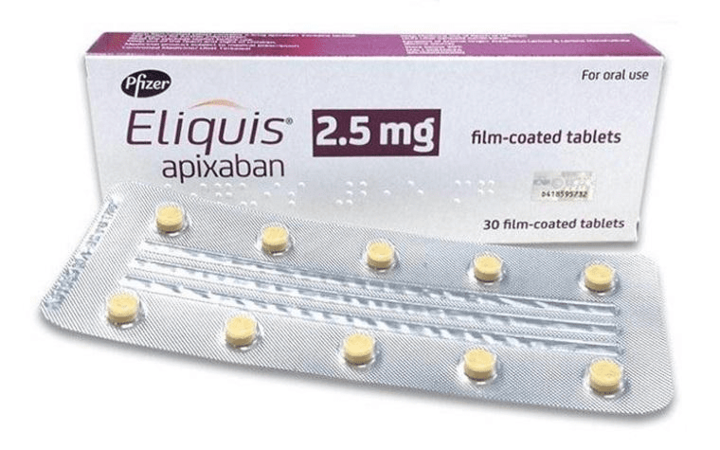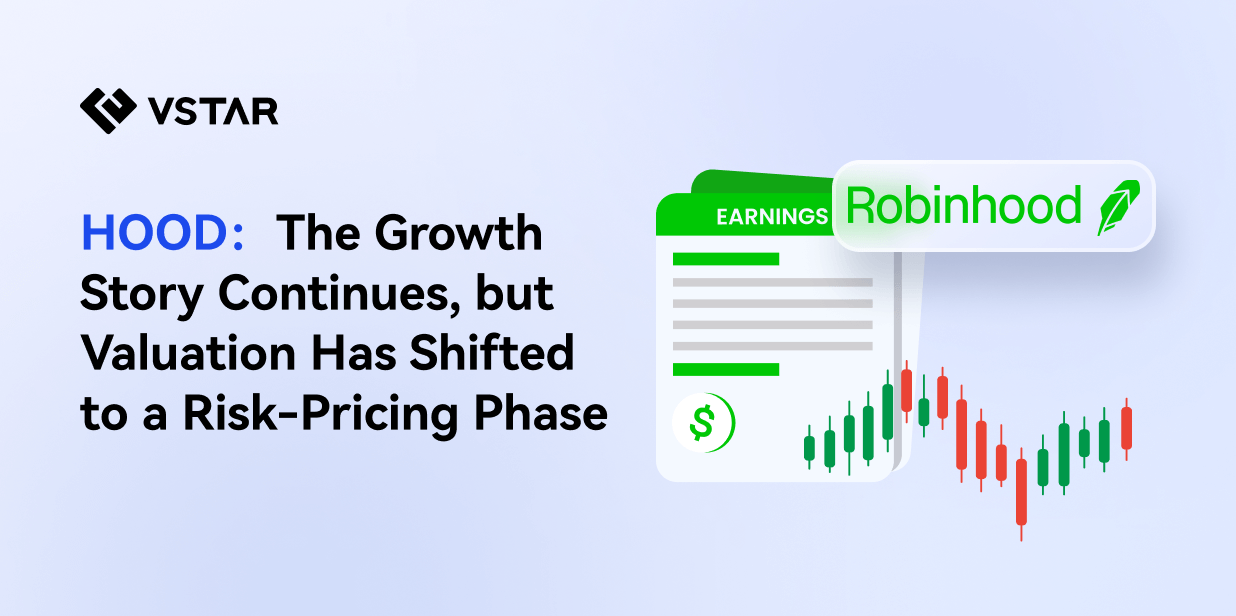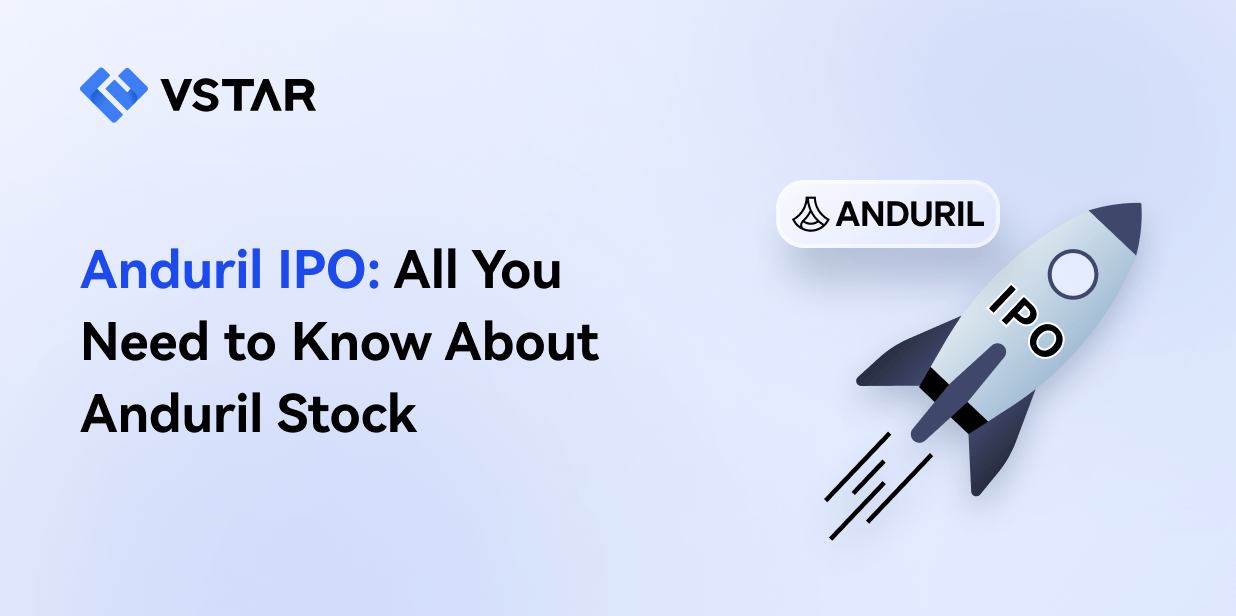Introduction
Bristol Myers Squibb Co (BMY) is a leading pharmaceutical company that develops and commercializes innovative medicines for a variety of diseases, including cancer, cardiovascular, immunology, fibrosis and neuroscience. BMY has a diversified and robust product portfolio that includes some of the world's best-selling medicines, such as Opdivo, Eliquis, Revlimid, Orencia, and Sprycel. BMY also has a strong pipeline of new drugs and therapies that are expected to drive future growth and profitability.
BMY has had significant developments and news, including positive Phase 3 results for deucravacitinib in the treatment of plaque psoriasis. The company plans to submit regulatory applications for deucravacitinib later this year. BMY also received FDA approval for Zeposia in ulcerative colitis, the first oral S1P receptor modulator for this disease. In addition, the acquisition of MyoKardia adds mavacamten, a potential treatment for obstructive hypertrophic cardiomyopathy, to BMY's cardiovascular portfolio. Mavacamten is currently under review by the FDA.
Bristol Myers Squibb Co's Overview
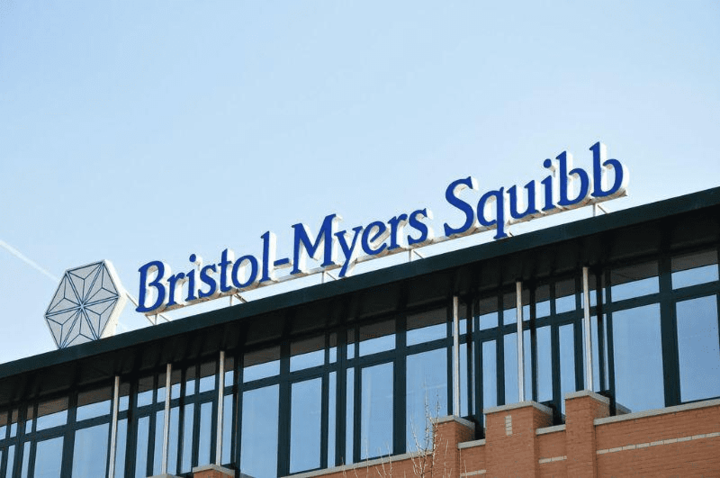
Source: phamauticaltechnologies.com
Bristol Myers Squibb Co. was founded in 1887 by William McLaren Bristol and John Ripley Myers as a manufacturer of pharmaceuticals and chemicals. The company is headquartered in New York City and operates in more than 60 countries and regions. The current CEO is Giovanni Caforio, who joined the company in 2000 and became CEO in 2015. BMY's major shareholders are The Vanguard Group Inc., BlackRock Inc., State Street Corp., Wellington Management Co. LLP, and Geode Capital Management LLC.
BMY has achieved some key milestones in its history, such as:
- In 1943, BMY became the first company to mass-produce penicillin.
- In 2001, BMY launched Plavix, a blockbuster antiplatelet drug that became one of the best-selling drugs in history.
- In 2019, BMY acquired Celgene Corporation, a biotechnology company that specializes in cancer and inflammatory diseases.
- In 2021, BMY launched six new products (Abecma, Breyanzi, Inrebic, Onureg, Reblozyl, and Zeposia).
- In 2022, BMY provided revenue and EPS guidance for the year and reaffirmed its long-term financial targets.
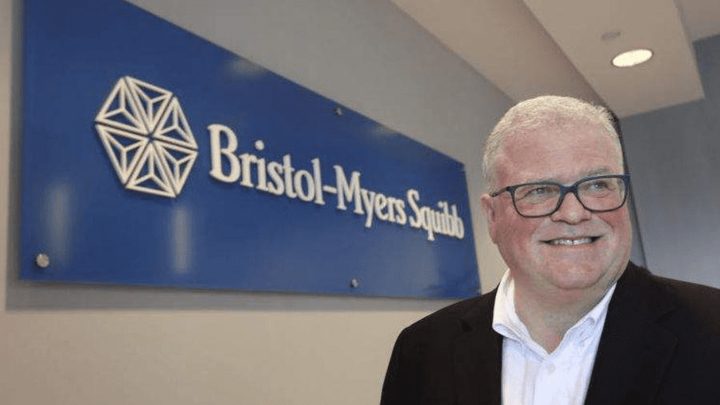
Source: tampabaytimes.com
Bristol Myers Squibb Co's Business Model and Products/Services
How Bristol Myers Squibb makes money
Bristol Myers Squibb generates revenue by developing and selling prescription drugs in four segments: Oncology, Hematology, Immunology, and Cardiovascular. The Oncology segment focuses on drugs for cancer, including Opdivo and Yervoy. The Hematology segment specializes in blood disorder treatments, such as Revlimid and Pomalyst. The Immunology segment focuses on immune-mediated diseases with products like Orencia and Zeposia. The Cardiovascular segment develops drugs for cardiovascular diseases, including Eliquis and Brilinta.
Main Products and Services
Source: payin1.in
Bristol Myers Squibb has a diversified and robust product portfolio, with some of the best-selling drugs in the world. The following table shows the top 10 products of BMY by revenue in 2023.
|
Drug name (therapy area) |
Revenue in 2023 (in million U.S. dollars) |
|
Revlimid (cancer) |
10,000 |
|
Eliquis (cardiovascular) |
11,800 |
|
Opdivo (cancer) |
8,200 |
|
Orencia (immunology) |
3,000 |
|
Sprycel (cancer) |
2,500 |
Bristol Myers Squibb Co's Financials, Growth, and Valuation Metrics
Review of Bristol Myers Squibb Co's financial statements
Bristol Myers Squibb Co has a strong financial performance and growth, driven by its diversified and robust product portfolio, its strategic acquisitions and collaborations, and its continued investment in research and development. The following table shows the summary of BMY's financial statement.
|
Financial Metrics |
Value as of March, 2023 (End of first quarter). |
|
Market Capitalization |
$136.7 billion |
|
Net Income |
$2.3 billion |
|
Revenue Growth |
-3% |
|
Profit Margin |
20.3% |
|
Return on Equity |
11.9% |
|
Balance Sheet Strength and Implications |
BMY has a strong balance sheet with a debt-to-equity ratio of 0.6, a current ratio of 1.4, and an interest coverage ratio of 8.4. BMY has sufficient liquidity and solvency to meet its short-term and long-term obligations, invest in growth opportunities and return value to shareholders through dividends and share buybacks. |
Comparison of BMY's Valuation Multiples to Its Peers and the Industry
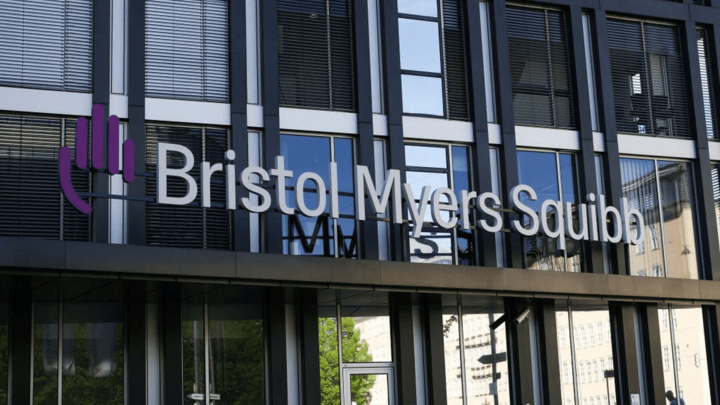
Source: fiercepharma.com
One way to assess BMY's valuation is to compare its valuation multiples, such as price-to-earnings (P/E), price-to-sales (P/S), price-to-book (P/B), and enterprise value-to-EBITDA (EV/EBITDA), to its peers and the industry. These multiples reflect how much investors are willing to pay for a company's earnings, sales, book value, or EBITDA, relative to its market value or enterprise value. The following table shows the comparison of BMY's valuation multiples to some of its peers and the industry as of June 4, 2023.
|
Company |
P/E |
P/S |
P/B |
EV/EBITDA |
|
BMY |
8.3 |
2.9 |
2.4 |
9.0 |
|
Merck |
12.5 |
4.1 |
7.1 |
11.6 |
|
Pfizer |
10.1 |
3.8 |
2.9 |
10.4 |
|
J&J |
16.7 |
4.9 |
6.0 |
13.9 |
Based on this table, BMY has lower valuation multiples compared to peers and the industry, indicating it is relatively undervalued. It has the lowest P/E ratio, suggesting underappreciated earnings potential. BMY also has the lowest P/S ratio, indicating higher sales efficiency. With the lowest P/B ratio, BMY has a lower market value relative to book value. It also has the lowest EV/EBITDA ratio, implying a lower enterprise value relative to EBITDA compared to its peers.
BMY Stock Performance Analysis

Source: tradingview.com
A. BMY Stock Trading Information
BMY stock is traded on the New York Stock Exchange (NYSE) under the ticker symbol BMY. The following table shows some of the key trading information for BMY stock as of June 4, 2023.
|
Item |
Value |
|
IPO Time |
July 2, 1972 |
|
Primary Exchange & Ticker |
NYSE: BMY |
|
Country & Currency |
USA: USD |
|
Trading Hours |
Mon-Fri: 9:30 am - 4:00 pm ET |
|
Pre-Market |
Mon-Fri: 4:00 am - 9:30 am ET |
|
After-Market |
Mon-Fri: 4:00 pm - 8:00 pm ET |
|
Stock Splits |
None since IPO |
|
Dividends |
Quarterly: $0.57 per share |
|
Dividend Yield |
3.61% |
B. BMY Stock Price Performance Since its IPO
Here are the Historical Highs and Lows for BMY stock since its IPO:
- All-time High: $81.44 on Jan 20, 2020
- All-time Low: $0.75 on Dec 31, 1974
- 52-week High: $81.44 on Jan 20, 2020
- 52-week Low: $62.63 on Jul 7, 2023
- Year-to-date High: $74.94 on Jan 3, 2023
- Year-to-date Low: $62.63 on Jul 7, 2023
BMY's Current Stock Price is $62.79 as of Jul 12, 2023
Stock Price Volatility Analysis: BMY has a beta of 0.42, indicating lower volatility compared to the market average of 1. The stock's standard deviation of daily returns for the past year is 15.23%, lower than the industry average of 19.67%.
Key Drivers of BMY Stock Price: Factors impacting BMY's stock price include:
- Performance and outlook of products, particularly in the oncology and immunology segments.
- Progress and results of the research and development pipeline, including potential blockbuster drugs.
- Competition from other pharmaceutical companies, especially in biosimilars and generics.
- Regulatory and legal environment, affecting approvals, product launches, and intellectual property.
- Macroeconomic and geopolitical factors, such as COVID-19, trade tensions, and healthcare policy changes.
C. BMY Stock Price Forecast
BMY Stock Price Trend Analysis: BMY's stock price has been trending downward since reaching its all-time high of $81.44 in January 2020. The stock has been underperforming the S&P 500 index and the healthcare sector in the past year, as it faced some headwinds such as the loss of exclusivity for some of its key drugs (such as Eliquis and Revlimid), the integration challenges of its acquisition of Celgene, and the uncertainty over its future growth prospects. However, some analysts believe that BMY's stock price is undervalued and offers an attractive entry point for long-term investors who are looking for a stable dividend payer with a strong pipeline and a diversified portfolio.
Analyst Recommendations and Price Targets
According to StockAnalysis.com, the average rating for BMY stock is “Buy”, based on 13 analysts' opinions. The table below shows the breakdown of the ratings and the number of analysts giving each rating.
|
Rating |
Number of Analysts |
|
Buy |
10 |
|
Hold |
2 |
|
Sell |
1 |
According to Yahoo Finance, the average price target for BMY stock is $78.17, which implies an upside potential of 24.77% from the current price of $62.65 as of the July 7 2023 close. The table below shows the price targets from some of the major analysts and the implied upside/downside.
|
Analyst |
Price Target |
Implied Upside/Downside |
|
Morgan Stanley |
$85.00 |
+35.70% |
|
Credit Suisse |
$83.00 |
+32.49% |
|
JPMorgan Chase |
$80.00 |
+27.72% |
|
Bank of America |
$79.00 |
+26.11% |
|
Citigroup |
$78.00 |
+24.51% |
|
Barclays |
$77.00 |
+22.90% |
|
UBS |
$76.00 |
+21.30% |
According to WSJ, the consensus forecast among 21 analysts covering BMY stock is a "buy," with a median target of $79.00 and a range of $67.00 to $85.00.
Challenges and Opportunities

Source: Clearrisk.com
Competitive Risks
Main Competitors
Bristol Myers Squibb (BMY) competes with major pharmaceutical companies like Pfizer, Tilray, Johnson & Johnson, Canopy Growth, Merck, Aurora Cannabis, and AstraZeneca. One significant threat to BMY's market share and revenue is the emergence of biosimilars and generics for key drugs like Eliquis, Revlimid, and Opdivo. Biosimilars are similar versions of biological drugs, while generics are identical copies of small-molecule drugs. These alternatives often offer lower prices, potentially attracting customers and reducing demand for BMY's products.
For instance, Eliquis may face biosimilar competition from Pfizer and Mylan in Europe in 2023, Revlimid may face generic competition from Natco Pharma in the US in 2022, and Opdivo may face biosimilar competition from Samsung Bioepis and Celltrion in Europe in 2024.
Competitive Advantages
BMY has several competitive advantages that may help maintain or strengthen its market position and profitability. These advantages include:
- Diversified product portfolio: BMY offers a broad range of products in therapeutic areas such as oncology, hematology, cardiovascular, immunology, fibrotic, neuroscience and covid-19.
- Strong R&D Pipeline: BMY has a robust research and development pipeline that includes potential blockbuster drugs such as deucravacitinib, relatlimab, mavacamten, idecabtagene vicleucel and liso-cel.
- The strategic acquisition of Celgene: The acquisition of Celgene in 2019 strengthened BMY's presence and capabilities in the oncology and hematology markets.
By leveraging these competitive advantages, BMY is well positioned to navigate the competitive landscape and drive growth in the healthcare industry.
Other Risks
Regulatory and Legal Risks: BMY faces regulatory and legal risks that could impact its product approvals, patent defense, and intellectual property rights. Ongoing patent litigation cases involving key drugs like Eliquis, Revlimid, Opdivo, Sprycel, and Orencia pose potential threats to BMY's market exclusivity and may lead to damages or royalties.
Macroeconomic and Geopolitical Risks: BMY is exposed to macroeconomic and geopolitical risks that can affect demand, supply chain operations, and pricing power. The COVID-19 pandemic, for instance, has disrupted the global healthcare system, impacting BMY's operations and sales. Reduced patient visits, supply chain disruptions, and increased pressure to reduce healthcare costs were notable challenges.
Growth Opportunities
Emerging Markets: BMY aims to expand in emerging markets like China, India, Brazil, Russia, and Turkey. These markets have growing populations, rising healthcare spending, and unmet medical needs. BMY invests in market access, partnerships, and product portfolio. It launched Opdivo, Eliquis, Orencia, and Sprycel in China. The partnership with BeiGene helps develop oncology drugs. BMY expects 13% CAGR sales growth in emerging markets from 2020 to 2025.
Biosimilars: BMY enters the biosimilar market with expertise in biologics. Biosimilars are cost-effective alternatives. The market is projected to reach $69.3 billion by 2027 with a 24.7% CAGR. BMY develops biosimilars with Samsung Bioepis and Momenta Pharmaceuticals. Examples include Ontruzant, Renflexis, Eticovo, Hadlima, and Orencia SC. These biosimilars increase BMY's market share and revenue in biologics.
COVID-19: BMY contributes to the fight against COVID-19. It joined the COVID R&D Alliance to accelerate therapies. BMY partners with Pfizer to evaluate Eliquis for COVID-19 patients. BMY donates $40 million to support relief efforts in 43 countries impacted by the pandemic.
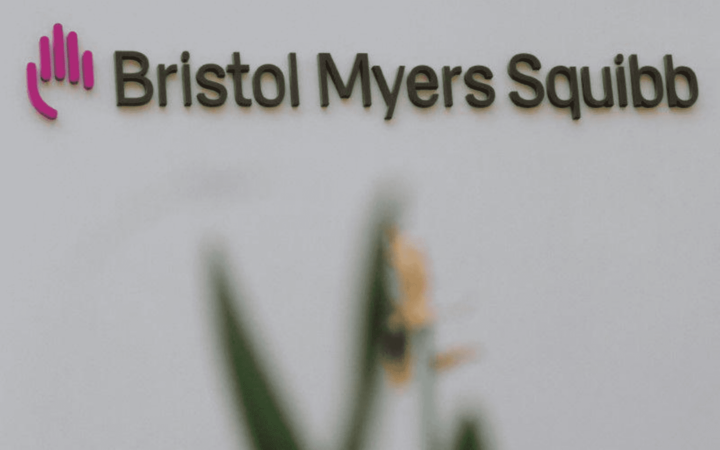
Source: reuters.com
Future Outlook and Expansion
BMY has a positive outlook for its future growth and expansion, as it expects to deliver strong financial performance and innovation in the next five years. BMY projects its revenue to grow at a CAGR of 8% from 2020 to 2025 and reach $55 billion by 2025. BMY also expects its earnings per share (EPS) to grow at a CAGR of 20% from 2020 to 2025 and reach $10 by 2025. Moreover, BMY anticipates its free cash flow to grow at a CAGR of 15% from 2020 to 2025 and reach $20 billion by 2025.
BMY's growth targets are based on four strategic priorities: commercial excellence, pipeline advancement, successful Celgene integration and improved capital allocation. Commercial excellence includes maximizing the potential of current products, expanding in emerging markets, launching new products and entering new therapeutic areas. Pipeline advancement includes R&D investments, accelerating late-stage development, pursuing external innovation and exploring new modalities. Successfully integrating Celgene involves achieving synergies, retaining talent, leveraging capabilities and meeting commitments. Improved capital allocation includes maintaining a strong balance sheet, returning capital to shareholders, investing in organic growth and pursuing strategic acquisitions or partnerships.
Why Traders Should Consider BMY Stock

Source: tradingview.com
Reasons Why Traders Should Consider BMY Stock
BMY stock is a compelling choice for traders who are looking for a well-established, diversified, and innovative pharmaceutical company with strong growth potential and attractive valuation. Some of the reasons why traders should consider BMY stock are:
- Robust product portfolio: Best-selling drugs like Revlimid, Eliquis, and Opdivo generate stable revenues with strong market positions.
- Promising new products: Abecma, Breyanzi, Reblozyl, Zeposia, and relatimab target high unmet needs in areas like cancer and neurology.
- Strategic acquisitions and collaborations: Integration of Celgene and partnerships with Pfizer, Janssen, and bluebird bio enhance capabilities and expand market reach.
- Continued R&D investment: Approximately 15% of revenues allocated to R&D, focusing on oncology, hematology, and other therapeutic areas.
- Diversified pipeline: More than 50 clinical programs with potential breakthrough therapies to improve patient care.
Key Resistance & Support Levels of BMY Stock
BMY stock has been trading in an uptrend since October 2022, rising from a low of $60 per share to a high of $75 per share. The stock is currently facing strong resistance at $75 per share, which coincides with its previous high in July 2023 and its 200-day moving average. The stock is also facing strong support at $70 per share, which is its 50-day moving average and has been tested several times.
The stock may continue to trade within this range until a significant catalyst emerges, such as positive earnings results or clinical data. A break above the resistance level could signal a bullish momentum and open the way for further upside towards $80 per share, which is the next major resistance level and the all-time high. A break below the support level could signal a bearish momentum and trigger further downside towards $65 per share, which is the next major support level and the previous low.
The following chart shows the technical analysis of BMY stock using TradingView:
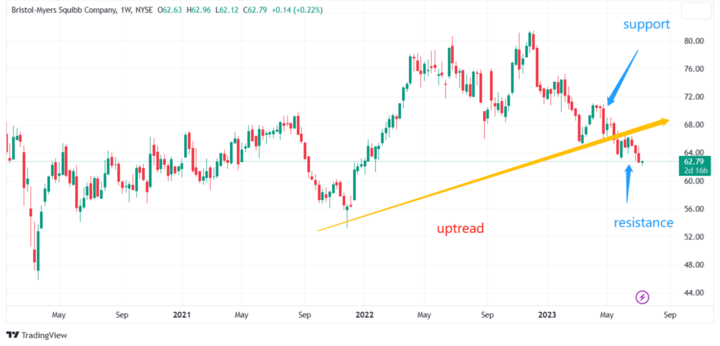
Source: tradingview.com
Trading Strategy for BMY Stock
One of the trading strategies that traders can use to trade BMY stock is CFD trading. CFD stands for contract for difference, which is a type of derivative that allows traders to speculate on the price movements of an underlying asset, such as a stock, without owning or delivering the asset.
Some of the advantages of CFD trading are:
- Leverage: Trade larger positions with a smaller deposit, amplifying potential profits or losses.
- Short selling: Take advantage of falling prices by selling stocks, offering flexibility in both rising and falling markets.
- Hedging: Offset potential losses by opening opposite positions, providing protection for existing portfolios.
- Diversification: Access various markets and instruments (stocks, indices, commodities, currencies, cryptocurrencies) from one platform, reducing overall risk.
Trade BMY Stock CFDs with VSTAR
VSTAR is a leading online trading platform that offers CFD trading on a wide range of markets and instruments, including BMY stock. Some of the advantages of trading BMY stock CFDs with VSTAR are:
- Competitive spreads: VSTAR offers competitive spreads for trading CFD stock, reducing trading costs and providing access to favorable trading conditions.
- Trade in any direction: VSTAR allows trading CFD stock in both upward and downward price movements, offering more trading opportunities and flexibility.
- Leverage: VSTAR provides leverage options, enabling traders to open larger positions with a smaller deposit, maximizing their trading potential.
- Professional customer support: VSTAR's customer support team is professional and responsive, ensuring a smooth trading experience and addressing any inquiries promptly.
VSTAR's user-friendly app caters to both experienced and novice traders. Key features include a low minimum deposit requirement of $50, protection against negative balances, real-time market access, and the availability of demo accounts for risk-free practice.


How to trade BMY Stock CFDs with VSTAR
- Download the VSTAR app from App Store or Google Play and register an account.
- Deposit funds using preferred payment methods such as Visa, Mastercard, Tether, Skrill, Netteller, SticPay, or Perfect Money.
- Search for CSX stock in the app and access the trading screen.
- Customize your trade size, leverage, stop loss, and take profit levels.
- Based on your market analysis, choose to buy (go long) or sell (go short) CFDs.
- Confirm your trade and monitor the position until you close it or it reaches your stop loss level.
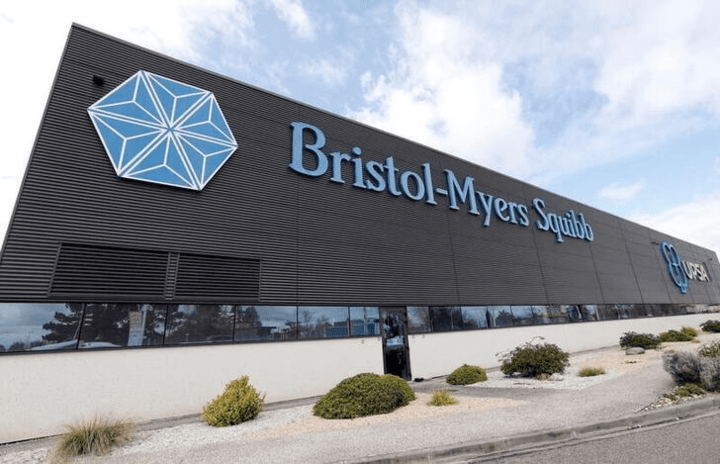
Source: reuters.com
Conclusion
BMY stock is a solid choice for traders who are looking for a well-established, diversified, and innovative pharmaceutical company with strong growth potential and an attractive valuation. BMY has a robust product portfolio, a promising new product portfolio, a strategic acquisition and collaboration strategy, a continued investment in research and development, and an attractive dividend yield. BMY stock has been trading in a sideways trend since October 2021, fluctuating between a narrow range of $60 to $65 per share. The stock may continue to trade within this range until a significant catalyst emerges, such as positive earnings results or clinical data.
BMY stock is a compelling opportunity for traders who want to benefit from the performance of a leading pharmaceutical company with strong fundamentals and growth prospects. By using CFD trading on VSTAR's platform, traders can access this opportunity with ease and convenience.








